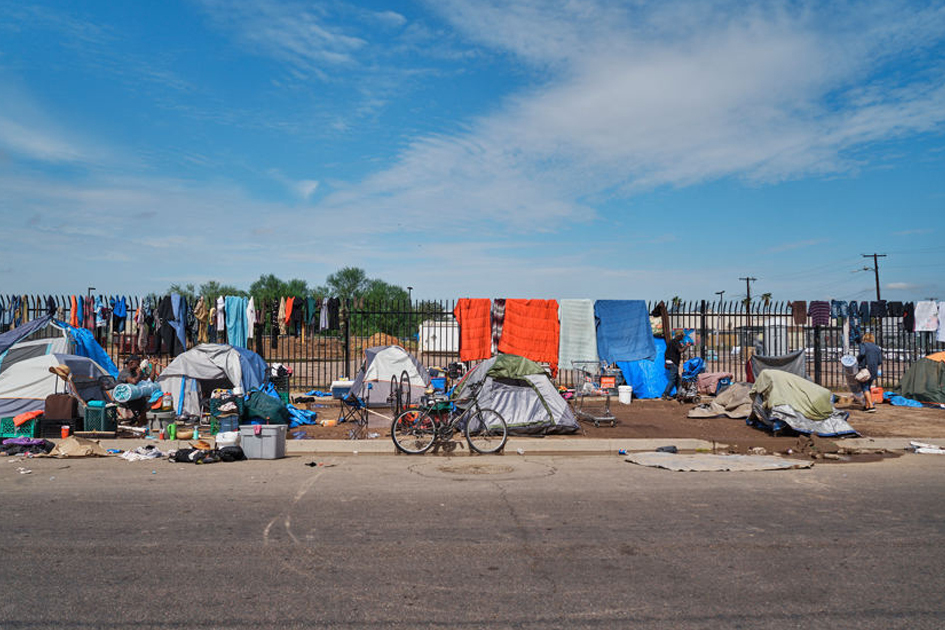It was my first time in Arizona and I was lost. I was on assignment for an upcoming story—scouting and interviewing a woman who’d started a nonprofit for people experiencing homelessness in downtown Phoenix. But I couldn’t seem to find the address. Snaking through the bustling streets in the middle of the weekend brunch rush, I felt dwarfed by the skyscrapers.

Photography by Keith Pitts
I turned a corner and suddenly found myself in a different reality. The skyscrapers were gone, and in their place hung rows of tents and tarp canopies. Clothes draped over chain-link fences. People walked with bicycles or shopping carts, carrying bags and boxes of belongings. I was shocked at the contrast to my surroundings less than a minute before. Our photographer arrived and said, “Wow. I live 10 minutes away and had no clue this existed.”
When I returned to Atlanta, where I’ve lived for the past 15 years, I wondered what might be hidden among its landmarks. I knew the statistics about people without homes and paid attention to various ministries throughout the city. But did I know anybody, specifically and by name, in that situation?
Often the Bible can feel nebulous and beyond our grasp, where delicate consideration must be given to the original language, its intended audience, culture at the time, and even the genre of its books. But in the gospels and the words of Jesus, He was unequivocal about how we’re to make His love manifest on earth. The commands were simple and without condition.

Under a makeshift canopy, one man searches for extra food to feed his dog.
In fact, towards the end of Matthew’s gospel, Jesus is about as direct and specific as possible, setting the scene of our first encounter with the Most High God. We all know the verses:
“Then the King will say to those on His right, ‘Come, you who are blessed of My Father, inherit the kingdom prepared for you from the foundation of the world. For I was hungry, and you gave Me something to eat; I was thirsty, and you gave Me something to drink; I was a stranger, and you invited Me in; naked, and you clothed Me; I was sick, and you visited Me; I was in prison, and you came to Me … Truly I say to you, to the extent that you did it for one of the least of these brothers or sisters of Mine, you did it for Me.’” (Matthew 25:34-40)
When we stand before the Father, we’re not going to be asked about a particular theology or doctrine we held, but simply whom did we feed? Whom did we clothe? Whom did we welcome? Whom did we care for? And though Jesus is speaking to His followers, this kind of compassion isn’t reserved for believers alone. Parables like the Good Samaritan reveal that no one is excluded from the scope of our concern—not even those we would consider enemies.
The refrain of caring for those in need flows through the entire text of the Bible. Even in passages from the Old Testament, such as Zechariah 7:8-10, it is clear that God wants us to run toward the marginalized, not away: “The word of the Lord came to Zechariah, saying, “This is what the Lord of armies has said: ‘Dispense true justice and practice kindness and compassion each to his brother; and do not oppress the widow or the orphan, the stranger or the poor; and do not devise evil in your hearts against one another.’”
I realized that, whether by circumstance or design, my day-to-day routine puts distance between me and those in greatest need—and it’s true for many of us. Whether we pass by a prison, secluded and nearly inaccessible, or an unhoused community sequestered in an ignored part of town, our lives are siloed from the individuals Christ specifically commands His followers to serve. How can we fulfill this calling when our lifestyle is at odds with this mandate? How can we bear each other's burdens if we are not near or in a relationship?
The love Christ expects from us requires a deliberate awareness of those around us, and a willingness to perhaps make the slightest of turns around another corner, as my photographer and I experienced in Phoenix. To love our neighbors is to be close enough to understand their distress.





